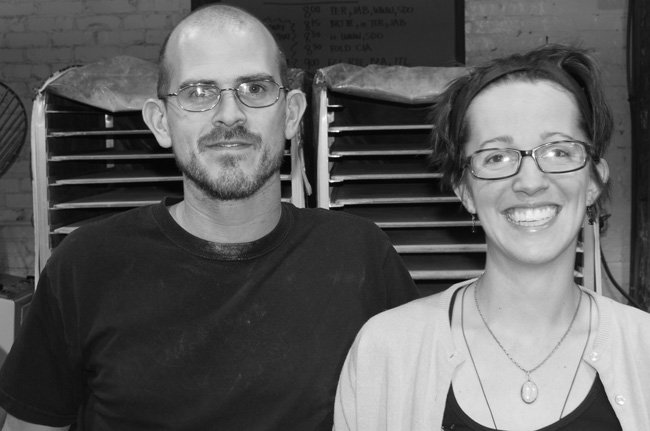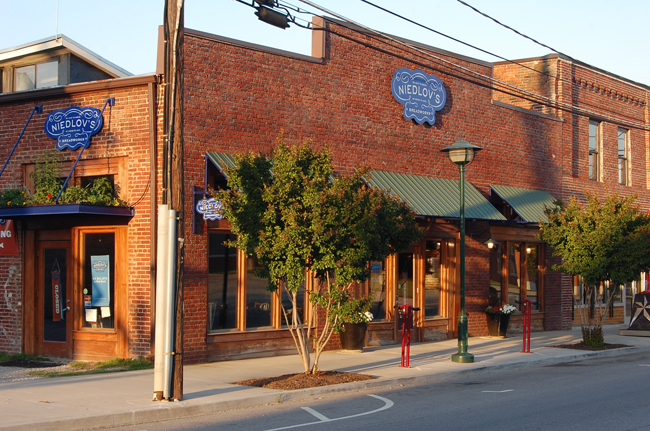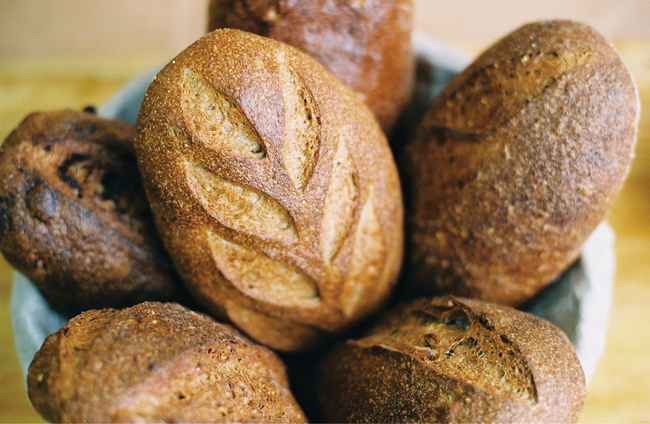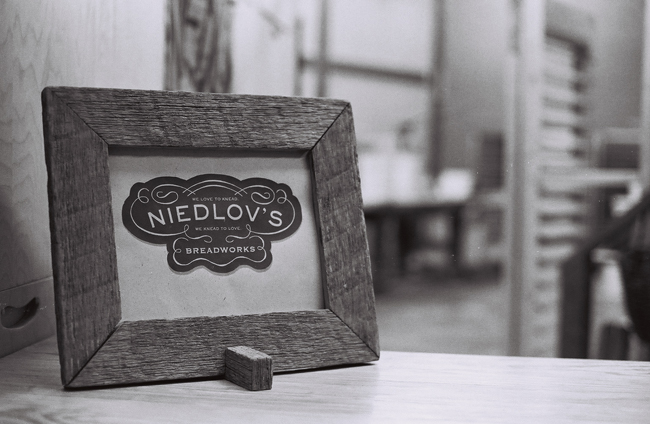From Zingerman’s to Niedlov’s
*From time to time, we share the writing of our friends and co-workers on this site. Today’s guest post comes from Zingerman’s alumnus John Sweet.
John was Assistant Bread Manager at Zingerman’s Bakehouse from 1998-2002. He and his wife Angela (also a Bakehouse alum) started Niedlov’s Breadworks in 2002. Niedlov’s was honored by the U.S. Small Business Administration as Tennessee’s Small Business of the Year in 2010.

In a recent article on Yahoo Finance, John shared 10 thoughts on the 10 years that he has owned and operated Niedlov’s Breadworks. He was asked what, if any, influence his time in the Zingerman’s Community of Businesses had on his development as an entrepreneur and business owner. This is his response:
Experiencing Success
Taking Responsibility for the Effectiveness of Your Own Small Business’s Development.
We used to talk a lot in the Bread Department at Zingerman’s Bakehouse about being set up for success. In a system as detailed as theirs for producing handcrafted breads in a traditional fashion, there were many opportunities every day to set others up, and to be set up by others, for success. As we set up Niedlov’s Breadworks in Chattanooga, TN, 10 years ago, this became our operating motto: “The best way to ensure that we are successful is to set ourselves up for success.”In reflecting recently on the last decade, I realized that Niedlov’s owes a lot to Zingerman’s for helping prepare us for our own entrepreneurial endeavor. Here are 5 specific ways that Zingerman’s helped set Angela and me up for success as we established and grew what has become a prominent example of a local, independent, community-oriented, brick-and-mortar, Main Street, family business helping to revitalize a Downtown neighborhood as a part of Chattanooga’s Renaissance.

1. Systems Everywhere
The thing about Zingerman’s Bakehouse that has had the greatest impact on Niedlov’s success was experiencing and understanding their use of systems. Systems for mixing, systems for shaping, systems for baking. For taking orders, managing inventory, delivering bread, packaging pastries, icing cakes, juicing oranges, sheeting croissants, scaling ingredients, scooping cookies, and rolling bagels. There is a specific time and a place, particular tools and materials, and a trainable method or technique for doing everything. As Niedlov’s has grown over the years, we have tried to develop (and document) systems throughout the bakery. Our systems have had to handle growth (more bread, more products, more employees, and more departments) and after 10 years, we have a fairly detailed set of functional systems unique to our circumstances. Every person is more efficient, and every process works better, when there’s a good system.
2. Passionate People and The Importance of Culture
Zingerman’s Bakehouse employs many qualified craftspeople to create their delicious breads, pastries, and cakes, as well as a team of committed service professionals selling the food and delivering the goods. These are passionate and hard-working people who enjoy their work and care about what they do. It is a culture that I admire and set out to recreate in my own organization. Establishing a culture like this is hard work, but once done, it tends to sustain itself. I left Zingerman’s taking our future culture very seriously. Niedlov’s had a Mission Statement, Employee Handbook, and a Training Manual before we had any employees. One of the best tools we now have for hiring is getting recommendations from current or past employees who understand our culture.
3. Vision
Within the organization, Zingerman’s is evangelical about their Vision. I don’t know what its name is currently, but in 2002 they were on the “Road to 2009.” Yes, their vision had a name. And I’m sure their current one does, too. (Yep, it’s now called the “2020 Vision.”) It’s that important. It gets recreated every 10 or 15 years with serious engagement from throughout the organization, from partners and managers, to supervisors and front-line staff. At Niedlov’s, we initially set out to establish an artisan bakery in a city that didn’t have one. Once we’d accomplished that, we set our sights on becoming a sustainable business. Along the way we established our corporate identity, which was a process of discovery as well as definition. A critical part of identifying ourselves was defining success: determining what, exactly, would make Niedlov’s successful. This led us to the adoption of some Guiding Principles (a la Zingerman’s) and then from there we laid out our specific goals and the Path to Achievement. Niedlov’s accomplished most of what we had envisioned by our 10th anniversary, and are currently in the process of creating our next Vision.
4. Rules of Thumb
The Road to Success is paved with problems. The mark of success is NOT that you would have less problems, but that you would have better problems. I think I heard Ari say this (or something close to this) a hundred times throughout my years at Zingerman’s. And it’s really true. You never don’t have any problems. But hopefully, over time, you trade in some of the bad ones (we don’t have enough customers), for better ones (we can’t keep up with demand.)
Prepare-Tell-Show-Do-Review: The 5 steps to teaching anyone to do anything, the Zingtrain way. The cornerstone of any training program, these steps are simple, yet profound, and eminently practical. I have used this method countless times in our bakery and in other areas of life.
Take the “Entrepreneurial Approach”: Everyone from partners and managers to frontline staff had an opportunity to make what they wanted out of their work experience at Zingerman’s. If you wanted to change something, you were welcomed and encouraged to suggest it. If it were a good idea, that was articulated (read: “sold”) well, and had potential to make a bottom line difference, it might be embraced. And the extent to which it would be embraced is mostly determined by how useful it became to others.
“I’m just glad that everyone decided to show up for work today.” Another Ari-ism, that represents not taking anything for granted. He understood that everyone had a choice to go to work or not, and that it’s the folks on the sandwich line, behind the coffee bar, in front of the oven, and at the cash register that make everything go every day.

5. Documentation and Over-Communication
It’s not really communicated until it’s written down, typed up, and/or signed off on. It all starts with the Zingerman’s Training Compact, which is the agreement made at the beginning of employment at Zingerman’s that both the manager and the employee sign on a new hire’s first day. Employees receive a Training Passport, detailing everything that they need to learn for their new job, and the time frame in which they’ll be expected to acquire the skills or knowledge.
And on and on it goes: Employee Handbook, performance reviews, Code Reds, Code Greens, The Vision, The Mission Statement; and signs galore explaining what makes great baked goods, what it takes to make a loaf of sourdough, and how to use the meat slicer, handle a customer complaint, and the proper method for hand washing. At Zingerman’s over-communication is encouraged. This is one area where Niedlov’s has a great opportunity for growth. As much as we DO communicate and document, we aren’t as religious about it as I wish we were – especially in the area of “appreciations.” I hope in the coming years, we can develop some better strategies for communicating information in a more impactful way.
Seeing failure is informative. Experiencing failure is educational. Seeing success is encouraging. But experiencing success is empowering. The success that I experienced as a leader at Zingerman’s equipped me for my own entrepreneurial adventure in a way that no school, or curriculum, or case studies, or even failures of my own, could have. Niedlov’s remains indebted to Zingerman’s for the model they have been, and continue to be. 10 years later, these experiences still resonate, as we lead an organization that aspires to be like Zingerman’s, in our own unique way.
Watch Niedlov’s latest video here.





Zingerman’s Art for Sale